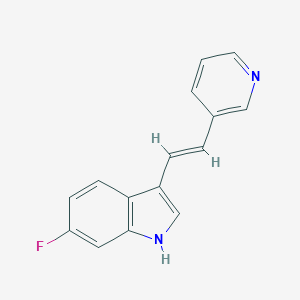Details of the Drug
General Information of Drug (ID: DMCDTIG)
| Drug Name |
680C91
|
||||||||||||||||||||||
|---|---|---|---|---|---|---|---|---|---|---|---|---|---|---|---|---|---|---|---|---|---|---|---|
| Synonyms |
163239-22-3; CHEMBL355606; 6-Fluoro-3-((E)-2-pyridin-3-yl-vinyl)-1H-indole; 6-fluoro-3-[(E)-2-pyridin-3-ylethenyl]-1H-indole; SCHEMBL3262721; SCHEMBL3262726; ZINC19965; CHEBI:131851; EX-A4573; BDBM50289137; s8997; AKOS024458137; 680C91, >=98% (HPLC); 680C-91; (e)-6-fluoro-3-[2-(3-pyridyl)vinyl]-1h-indole; (E)-6-Fluoro-3-(2-(pyridin-3-yl)vinyl)-1H-indole; 6-fluoro-3-[(E)-2-(pyridin-3-yl)vinyl]-1H-indole; Q27225279; 6-Fluoro-3-[(1E)-2-(3-pyridinyl)ethenyl]-1H-indole; 1H-Indole, 6-fluoro-3-[(1E)-2-(3-pyridinyl)ethenyl]-
|
||||||||||||||||||||||
| Indication |
|
||||||||||||||||||||||
| Drug Type |
Small molecular drug
|
||||||||||||||||||||||
| Structure |
 |
||||||||||||||||||||||
| 3D MOL | 2D MOL | ||||||||||||||||||||||
| #Ro5 Violations (Lipinski): 0 | Molecular Weight (mw) | 238.26 | |||||||||||||||||||||
| Logarithm of the Partition Coefficient (xlogp) | 3.3 | ||||||||||||||||||||||
| Rotatable Bond Count (rotbonds) | 2 | ||||||||||||||||||||||
| Hydrogen Bond Donor Count (hbonddonor) | 1 | ||||||||||||||||||||||
| Hydrogen Bond Acceptor Count (hbondacc) | 2 | ||||||||||||||||||||||
| Chemical Identifiers |
|
||||||||||||||||||||||
| Cross-matching ID | |||||||||||||||||||||||
Molecular Interaction Atlas of This Drug
 Drug Therapeutic Target (DTT) |
|
|||||||||||||||||||||||||||||||
|---|---|---|---|---|---|---|---|---|---|---|---|---|---|---|---|---|---|---|---|---|---|---|---|---|---|---|---|---|---|---|---|---|
 Drug Off-Target (DOT) |
|
|||||||||||||||||||||||||||||||
| Molecular Interaction Atlas (MIA) | ||||||||||||||||||||||||||||||||
References
